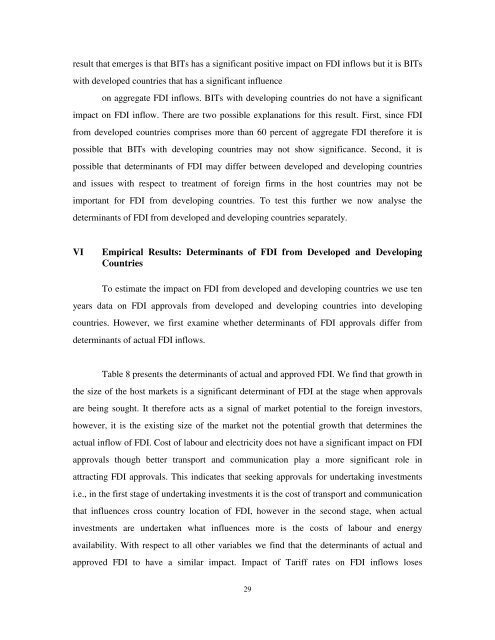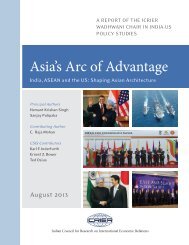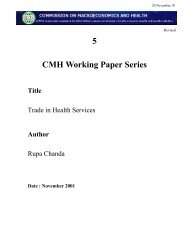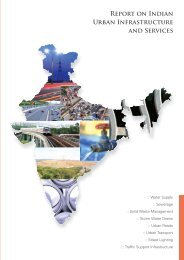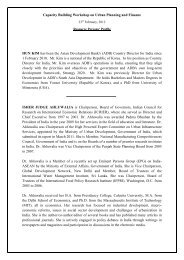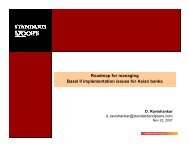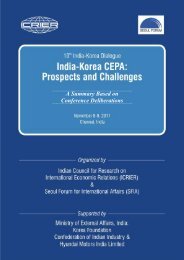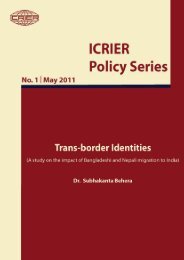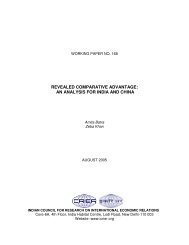impact of government policies and investment agreements on fdi ...
impact of government policies and investment agreements on fdi ...
impact of government policies and investment agreements on fdi ...
Create successful ePaper yourself
Turn your PDF publications into a flip-book with our unique Google optimized e-Paper software.
esult that emerges is that BITs has a significant positive <str<strong>on</strong>g>impact</str<strong>on</strong>g> <strong>on</strong> FDI inflows but it is BITs<br />
with developed countries that has a significant influence<br />
<strong>on</strong> aggregate FDI inflows. BITs with developing countries do not have a significant<br />
<str<strong>on</strong>g>impact</str<strong>on</strong>g> <strong>on</strong> FDI inflow. There are two possible explanati<strong>on</strong>s for this result. First, since FDI<br />
from developed countries comprises more than 60 percent <str<strong>on</strong>g>of</str<strong>on</strong>g> aggregate FDI therefore it is<br />
possible that BITs with developing countries may not show significance. Sec<strong>on</strong>d, it is<br />
possible that determinants <str<strong>on</strong>g>of</str<strong>on</strong>g> FDI may differ between developed <str<strong>on</strong>g>and</str<strong>on</strong>g> developing countries<br />
<str<strong>on</strong>g>and</str<strong>on</strong>g> issues with respect to treatment <str<strong>on</strong>g>of</str<strong>on</strong>g> foreign firms in the host countries may not be<br />
important for FDI from developing countries. To test this further we now analyse the<br />
determinants <str<strong>on</strong>g>of</str<strong>on</strong>g> FDI from developed <str<strong>on</strong>g>and</str<strong>on</strong>g> developing countries separately.<br />
VI<br />
Empirical Results: Determinants <str<strong>on</strong>g>of</str<strong>on</strong>g> FDI from Developed <str<strong>on</strong>g>and</str<strong>on</strong>g> Developing<br />
Countries<br />
To estimate the <str<strong>on</strong>g>impact</str<strong>on</strong>g> <strong>on</strong> FDI from developed <str<strong>on</strong>g>and</str<strong>on</strong>g> developing countries we use ten<br />
years data <strong>on</strong> FDI approvals from developed <str<strong>on</strong>g>and</str<strong>on</strong>g> developing countries into developing<br />
countries. However, we first examine whether determinants <str<strong>on</strong>g>of</str<strong>on</strong>g> FDI approvals differ from<br />
determinants <str<strong>on</strong>g>of</str<strong>on</strong>g> actual FDI inflows.<br />
Table 8 presents the determinants <str<strong>on</strong>g>of</str<strong>on</strong>g> actual <str<strong>on</strong>g>and</str<strong>on</strong>g> approved FDI. We find that growth in<br />
the size <str<strong>on</strong>g>of</str<strong>on</strong>g> the host markets is a significant determinant <str<strong>on</strong>g>of</str<strong>on</strong>g> FDI at the stage when approvals<br />
are being sought. It therefore acts as a signal <str<strong>on</strong>g>of</str<strong>on</strong>g> market potential to the foreign investors,<br />
however, it is the existing size <str<strong>on</strong>g>of</str<strong>on</strong>g> the market not the potential growth that determines the<br />
actual inflow <str<strong>on</strong>g>of</str<strong>on</strong>g> FDI. Cost <str<strong>on</strong>g>of</str<strong>on</strong>g> labour <str<strong>on</strong>g>and</str<strong>on</strong>g> electricity does not have a significant <str<strong>on</strong>g>impact</str<strong>on</strong>g> <strong>on</strong> FDI<br />
approvals though better transport <str<strong>on</strong>g>and</str<strong>on</strong>g> communicati<strong>on</strong> play a more significant role in<br />
attracting FDI approvals. This indicates that seeking approvals for undertaking <str<strong>on</strong>g>investment</str<strong>on</strong>g>s<br />
i.e., in the first stage <str<strong>on</strong>g>of</str<strong>on</strong>g> undertaking <str<strong>on</strong>g>investment</str<strong>on</strong>g>s it is the cost <str<strong>on</strong>g>of</str<strong>on</strong>g> transport <str<strong>on</strong>g>and</str<strong>on</strong>g> communicati<strong>on</strong><br />
that influences cross country locati<strong>on</strong> <str<strong>on</strong>g>of</str<strong>on</strong>g> FDI, however in the sec<strong>on</strong>d stage, when actual<br />
<str<strong>on</strong>g>investment</str<strong>on</strong>g>s are undertaken what influences more is the costs <str<strong>on</strong>g>of</str<strong>on</strong>g> labour <str<strong>on</strong>g>and</str<strong>on</strong>g> energy<br />
availability. With respect to all other variables we find that the determinants <str<strong>on</strong>g>of</str<strong>on</strong>g> actual <str<strong>on</strong>g>and</str<strong>on</strong>g><br />
approved FDI to have a similar <str<strong>on</strong>g>impact</str<strong>on</strong>g>. Impact <str<strong>on</strong>g>of</str<strong>on</strong>g> Tariff rates <strong>on</strong> FDI inflows loses<br />
29


